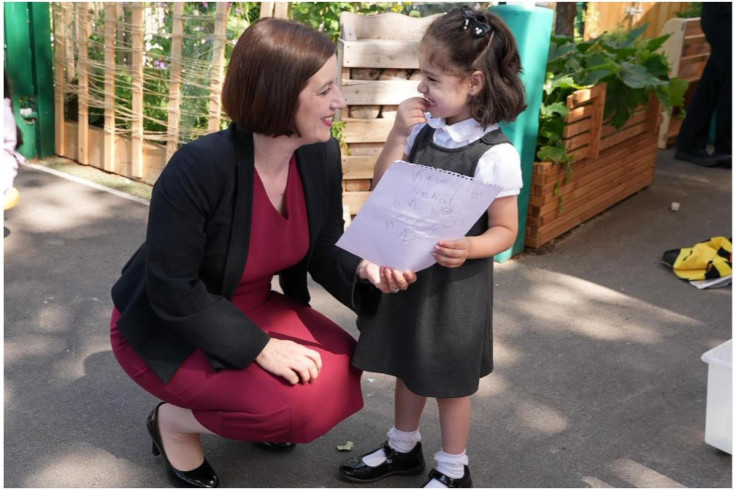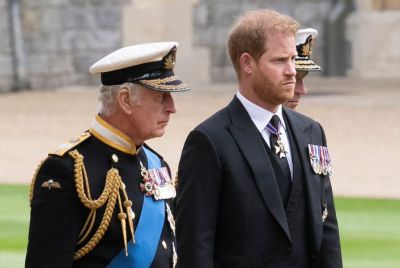Who Is Bridget Phillipson? Net Worth, Husband And Why Is She Leading The List For Next Deputy Leader?
Official records show modest earnings, despite exaggerated online claims about her wealth

Bridget Phillipson, the UK's Education Secretary and Minister for Women and Equalities, has emerged as a leading contender in Labour's race for deputy leader following Angela Rayner's decision to step down. With broad support across the party and strong polling among members, she is positioning herself as a candidate capable of bridging Labour's factions and appealing to both grassroots members and the leadership.
Since entering Parliament in 2010, Phillipson has built a reputation for championing working-class education and social mobility. Her rise reflects both her policy experience and her appeal as a unifying figure within the party.
Early Life and Political Career
Born in Gateshead, Tyne and Wear, on 19 December 1983, Phillipson grew up in a council house in Washington, raised by her mother, who later founded a domestic violence charity. She joined the Labour Party at 15 and studied Modern History at Oxford University, where she co-chaired the University Labour Club.
After working in the charity sector, she was elected MP for Houghton and Sunderland South at the age of 26. She progressed through roles including Opposition Whip and Shadow Chief Secretary to the Treasury in 2020, before becoming Shadow Education Secretary in 2021. When Labour formed a government under Sir Keir Starmer in July 2024, Phillipson was appointed Education Secretary and subsequently took on responsibility for Women and Equalities.
Family and Personal Background
Phillipson is married to Lawrence, who works in financial services. The couple live in London with their two children, who attend a state school. Colleagues say she often references her working-class roots and her own family's reliance on public services as part of her case for expanding opportunity and improving access to education, according to The Times.
Estimated Net Worth
Phillipson's earnings derive primarily from her MP's salary of £91,346 and her cabinet minister's allowance, bringing her annual income to just under £178,000, according to Wage Indicator UK. Additional declared income includes modest payments for speaking engagements. She has also declared donations to her office, including £14,000 from Lord Alli used to fund professional receptions linked to her 40th birthday, The Telegraph reported.
Public interest in her wealth has increased since she entered cabinet. While unverified online estimates have suggested figures running into the hundreds of millions, these claims are unsubstantiated and are not supported by official records.
Phillipson has addressed these disclosures openly, stressing the importance of transparency in public life.
Deputy Leadership Tested
On 9 September 2025, Phillipson confirmed her candidacy to succeed Rayner as deputy leader. She quickly secured the 44 MP nominations required to progress, narrowly ahead of Lucy Powell on 35, according to the Financial Times. Other candidates include Emily Thornberry, who entered the race with support from parts of the party's left.
Polling suggests Phillipson begins as the favourite. A Survation survey for LabourList gave her a net favourability rating of +39 per cent among members, compared with 20 per cent for Thornberry. Supporters argue she appeals both to the party grassroots and to the leadership, positioning her as a unifying figure amid internal divisions.
Her campaign emphasises the importance of unity, fairness and social mobility. She has spoken of her upbringing in the North East as shaping her politics and contends that her own journey demonstrates what Labour can offer working families.
I am running to be Deputy Leader of @UKLabour.
— Bridget Phillipson (@bphillipsonMP) September 9, 2025
As a proud working-class woman from the North East, I have come from a tough council street all the way to the Cabinet.
I will be a strong voice to unite our Party, take the fight to Reform, and deliver for our country.
So from telling us that Angela Rayner had done nothing wrong the day before she was forced to resign for tax evasion you now want her job! Forgive me if I question your judgement. I have grave doubts about having someone with those flaws in a position of responsibility!
— Simon Lester (@SimonLester24) September 9, 2025
Basically you are saying she's a decent human who was supporting her colleague. And now that the post is vacant - not her politics - she's applying for it. I see no wrong. Why make it up?
— Qurious (@Citizen_Qurious) September 9, 2025
Candidate of Labour's renewal
Phillipson's rise from a council house to the cabinet has been framed as reflecting Labour's message of renewal under Starmer. While speculation about her wealth persists, her record in education policy and her standing within the party carry more weight among members.
As the nomination deadline approaches, Phillipson remains well placed to secure a leading role in Labour's next chapter. The outcome will determine who succeeds Angela Rayner and how the party balances continuity with change in the years ahead.
© Copyright IBTimes 2025. All rights reserved.




















